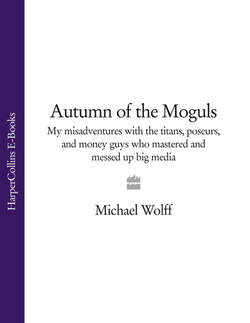Читать книгу Autumn of the Moguls: My Misadventures with the Titans, Poseurs, and Money Guys who Mastered and Messed Up Big Media - Michael Wolff - Страница 7
1 THE COMEDY
ОглавлениеThe media business is collapsing. The structure is caving in, like a monarchy, or colonial rule, or communism.
The handful of companies that control the consciousness of our time are trembling and heaving, about to fall victim to internal weakness and external obsolescence.
If by the spring of 2002, this seemed obvious to many logically minded people, what logic did not account for were the moves and countermoves, as well as the pure denial, that delayed the inevitable end. Logic was up against the kind of powerful men, progressive business theories, public relations resources, and mountains of financial analysis—not to mention lots of charm and brutishness—that make most reporters and columnists end up believing that the moguls and their henchmen who run these businesses really do know what they’re doing and that the next big deal is the big deal that will bring about a perfectly realized, synergistic business condition.
Now, it is not just spin and spreadsheets that obfuscate the real predicament of these colossuses, but the media culture itself. The media, like all social and political systems, works on its own behalf. The social reality—to be a player in the media is to be among the most powerful people of the age—belies a contrary business reality, that the business barely supports itself.
We are in a novel of manners—the pretense is the thing.
Therefore, to tell the story of the media, you have to tell the story of the rituals and conceits and behavioral norms and notions of propriety that hold it up.
Instead of a purposeful business story, it should be something more like a drawing room comedy—not a story about corporate success and failure as much as one about individual need and weakness and, of course, opportunism.
How to reduce such vast companies and so many divergent players to a small stage? How to bring such outsized men with their praetorian retinues into the same room?
The task was to find these people in their element, to move among them seamlessly. To be of them—but not employed by them (or, even worse, sucked up to by them—because their charm is not ordinary charm).
How to find the functional equivalent of a weekend at an English country house with a representative set of mogul kingpins as the guests?
Indeed, if business is the center of the modern world, which most certainly it is, then we have to find the dramatic context in which to reveal its true character.
Let us wait for such an opportunity.
